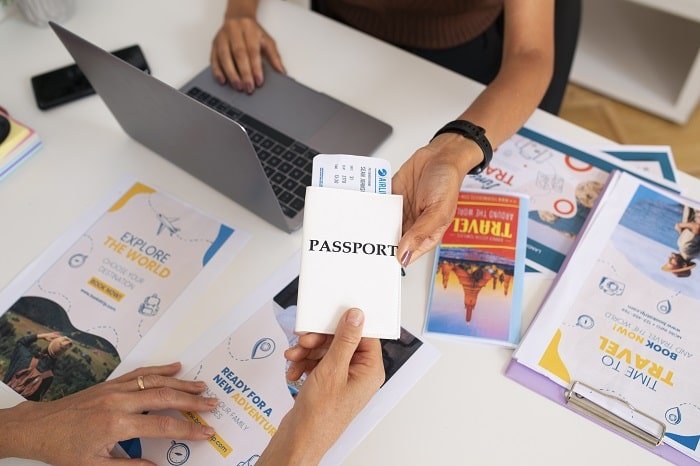
In today’s globalized world, business trips to new cities are often inevitable for professionals. A successful business trip accomplishes its objectives, fosters productive connections, and enhances professional growth, all while ensuring the traveler’s safety and well-being.
Planning and research are key pillars of a fruitful journey. From identifying trip goals to selecting the right destination and crafting a realistic itinerary, thoughtful preparation lays the foundation for a rewarding business trip.
This article will explore the essential aspects of planning a business trip to a new city, offering a comprehensive guide to help professionals navigate their travels smoothly and efficiently.
By the end of this article, readers will be equipped with the knowledge to turn their business trips into opportunities for success and enjoyable explorations of new places.
Preparation and Research
1. Identifying Trip Objectives and Goals
Before embarking on a business trip, it is crucial to define its objectives and goals. Are you attending a specific conference or meeting with clients? Do you aim to expand your professional network or scout new market opportunities? Perhaps you intend to combine business with exploring a potential new location for your enterprise.
Clearly understanding the purpose of your journey will help you plan effectively and ensure your time away is productive. It will also guide your research and preparation, ensuring you make the most of your trip.
2. Researching the New City and its Business Environment
Once you’ve identified your trip goals, it’s time to dive into researching the new city. Familiarize yourself with the local business landscape, including key industries, prominent companies, and recent economic developments. Understanding the city’s business environment will help you assess how your products or services might fare in that market and identify potential partners or clients.
Take time to learn about the city’s cultural and social norms, as well. This includes understanding local customs, etiquette, and business dress codes to ensure you make a good impression and avoid unintentional cultural gaffes. Researching these aspects ahead of time demonstrates respect for the local culture and can help build stronger connections.
3. Gathering Information on Local Customs and Etiquette
When it comes to customs and etiquette, every city and culture has its own set of unwritten rules. Showing up unprepared in this regard can lead to awkward situations and potentially damage professional relationships.
Research common greetings and appropriate gestures of respect. For example, in some cultures, it is customary to bow or shake hands with everyone in the room, while in others, removing your shoes before entering a home or office is expected. Being aware of these nuances can help you navigate social and professional interactions with ease.
Choosing the Right Destination
1. Selecting a City that Aligns with Business Goals
When choosing a destination for your business trip, ensure it aligns with your professional objectives. Consider a city with a strong presence of companies in your industry or a hub for startups if you aim to network and forge connections. Alternatively, if you’re seeking new market opportunities, opt for a city with a growing economy and a demand for your products or services.
Assess factors like industry conferences or trade shows that could provide valuable networking chances and insight into local market trends. By aligning your destination with your business goals, you increase the likelihood of a productive and successful trip.
2. Considering Factors like Industry Presence and Market Trends
Research the industry presence in potential destinations. Is there a cluster of companies in your field, creating a critical mass of expertise and potential partners? Are there specific zones or incubators that foster innovation in your sector? Choosing a city with a vibrant industry ecosystem can open doors to collaborations, investments, or simply learning from like-minded professionals.
Stay abreast of market trends and local economic developments. A city experiencing economic growth or one that has recently implemented business-friendly policies could present untapped opportunities for expansion or sales. By considering these factors, you can strategically choose a destination that maximizes the potential for your business endeavors.
3. Researching Local Resources and Infrastructure
In addition to industry presence and market trends, assess the local resources and infrastructure that can support your business activities. This includes researching co-working spaces, incubators, or accelerators that provide facilities and networking opportunities.
Also, consider the city’s digital infrastructure. Reliable internet access and robust mobile connectivity are essential for staying productive and connected during your trip. Ensure that your destination has the necessary resources to support your business needs, especially if you’re planning to work remotely for part of your stay.
Setting a Realistic Itinerary
1. Creating a Schedule that Balances Work and Downtime
Crafting a realistic itinerary is crucial for a successful business trip. Start by prioritizing your tasks and meetings, ensuring you allow sufficient time for travel between locations and accounting for potential delays.
Balance your work commitments with downtime to avoid burnout. Allocate time for meals, exercise, and exploring the local area to recharge and stay motivated. Remember, a well-rested mind is key to making the most of your trip and maintaining productivity throughout.
2. Prioritizing Tasks and Meetings
Prioritize your tasks and meetings based on their importance and urgency. Focus on the must-do activities first, ensuring you don’t overbook yourself and leave room for flexibility.
If there are people you specifically want to meet or companies you wish to visit, reach out and schedule appointments in advance. However, be prepared for last-minute changes and cancellations, and have backup plans in place to make efficient use of your time.
3. Leaving Room for Flexibility and Unexpected Events
Even the best-laid plans can go awry, so build flexibility into your itinerary. Allow for buffer time between appointments to accommodate for traffic delays or unexpected prolonging of meetings.
Be prepared for last-minute cancellations or changes in schedules, especially when dealing with busy professionals. Have a list of alternative activities or backup contacts to ensure you make the most of your time, even when plans shift.
Accommodation and Transportation
1. Selecting Appropriate Accommodations for Business Travelers
Choosing the right accommodation can make your business trip more comfortable and productive. Consider factors such as location, amenities, and price when making your selection.
Opt for accommodations conveniently located near your meeting venues or public transportation hubs to save time on commuting. Look for properties that cater to business travelers, offering amenities like reliable Wi-Fi, quiet workspaces, and early breakfast options.
If you’re traveling on a budget, consider sharing accommodations with colleagues or using rental services to find cost-effective options. Booking in advance and taking advantage of loyalty programs can also help secure better rates.
2. Researching Transportation Options and Booking in Advance
Research local transportation options to navigate the new city efficiently. Depending on your destination and preferences, you may rely on public transport, ride-sharing services, or rental cars.
If you plan to use public transportation, familiarize yourself with the system and purchase any necessary passes or tickets ahead of time. For ride-sharing or car rentals, compare rates and book in advance to secure the best deals and ensure availability.
Consider the environmental impact of your choices, too. Opting for eco-friendly transportation methods, such as electric cars or biking, can reduce your carbon footprint and provide a unique perspective of the city.
Building a Strong Network
1. Researching Local Business Networks and Organizations
Building a strong local network can be invaluable for your business. Research professional associations, chambers of commerce, and industry-specific groups in your destination city. These organizations often host events and provide resources to help businesses connect and thrive.
Attend networking events or conferences organized by these groups to meet like-minded professionals and potential clients or partners. It’s a great way to gain insights into the local business landscape and establish meaningful connections.
2. Attending Industry Events and Conferences
Industry events and conferences offer excellent networking opportunities. They attract professionals with similar interests and provide a platform to exchange ideas, learn about new developments, and forge connections.
Research upcoming events in your industry and plan your trip around them. By actively participating in discussions, workshops, and social gatherings associated with these events, you increase your chances of making valuable contacts and gaining insights that could benefit your business.
3. Connecting with Local Professionals on Social Media
Social media platforms can be powerful tools for networking before you even set foot in your destination city. Seek out local professionals in your industry or related fields through platforms like LinkedIn, Twitter, or Facebook groups.
Introduce yourself and express your interest in connecting during your trip. This way, you can hit the ground running with a list of potential contacts to meet and a better understanding of the local business landscape.
Staying Productive and Organized
1. Utilizing Digital Tools for Organization and Communication
Staying organized and connected during your trip is essential for maintaining productivity. Leverage digital tools to streamline your tasks and communications.
Use project management apps to create to-do lists, set reminders, and stay on top of your tasks. Messaging platforms and video conferencing tools enable you to stay in touch with your team and clients, ensuring seamless collaboration even while on the move.
2. Managing Time Zones and Staying in Touch with Colleagues
When traveling across time zones, be mindful of the impact on your schedule and that of your colleagues. Communicate your availability and plan meetings or calls accordingly to ensure everyone’s convenience.
Stay in regular contact with your team back home. Provide updates on your trip, and be responsive to their queries or concerns. This will help maintain a sense of connection and ensure everyone is on the same page regarding ongoing projects.
3. Finding Productive Workspaces and Coffee Shops
If you need a change of scenery or a quiet space to focus, scout for productive workspaces or coffee shops in the area. Many cities offer co-working spaces with day passes, providing you with a professional environment and the opportunity to network with other remote workers.
Alternatively, seek out cafes or libraries that offer a peaceful atmosphere and reliable internet connection. A change of pace can sometimes boost your productivity and creativity, so don’t be afraid to explore new workspaces.
Safety and Wellbeing
Your safety and wellbeing are paramount during any business trip. Before departing, research local safety guidelines and health precautions specific to your destination.
Stay informed about crime rates and areas to avoid. Understand cultural sensitivities and any potential risks associated with them. Additionally, be aware of local emergency services and the location of nearby medical facilities.
Taking care of your physical and mental health is essential for a successful trip. Maintain a healthy diet, stay hydrated, and get sufficient sleep to ensure you’re operating at your best.
Make time for exercise and outdoor activities to boost your energy levels and clear your mind. Striking a work-life balance will help you stay focused and productive while also allowing you to enjoy your time in the new city.
Conclusion
Planning a business trip to a new city involves careful preparation, research, and a touch of flexibility. By defining your trip goals, choosing the right destination, and setting a realistic itinerary, you can set the foundation for a productive journey.
Stay organized and connected through digital tools, and don’t forget to prioritize self-care and work-life balance. With these key takeaways in mind, you’re now equipped to navigate your next business trip with confidence and success.
Remember, each trip is a unique adventure, so embrace the unexpected, stay adaptable, and make the most of every opportunity that comes your way. Bon voyage!







